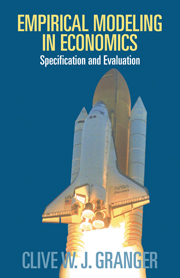3 - Comments on the evaluation of econometric models and of forecasts
Published online by Cambridge University Press: 22 September 2009
Summary
Plan of chapter
As this chapter contains material that is more technical than that used in the previous two essays, the form will be an unconventional one, with less formal sections discussing generally, but not precisely, what will be in the following formal sections. Thus section “1 INF” (for informal) will be informal and, hopefully, will help in the understanding of the context of the following section “1 FOR” (for formal). The chapter is discussing various approaches to the evaluation of econometric models and particularly of forecasts.
1 INF Is an empirical model worthwhile?
Econometricians and empirical modelers in economic fields spend a great deal of effort in constructing their models. Appropriate data are gathered, alternative specifications considered, a good dose of economic theory inserted and the model is carefully estimated. The final model is then ready to be presented to the public like some exotic dish in an expensive restaurant. Just looking at the model, the natural question arises – is it any good? Unfortunately, this question is not answered very often, or is not always taken very seriously. To approach the question, it is important for the purpose of the model to be clearly specified; again a statement of purpose is often not attached or is not sufficiently precise to be useful.
- Type
- Chapter
- Information
- Empirical Modeling in EconomicsSpecification and Evaluation, pp. 61 - 96Publisher: Cambridge University PressPrint publication year: 1999
- 1
- Cited by



